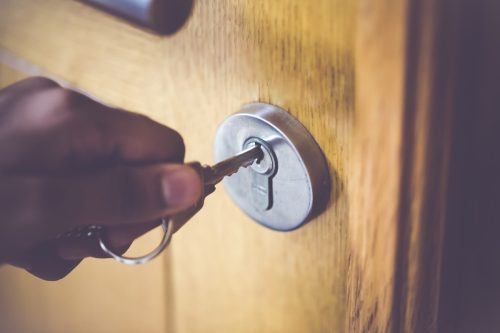5 Questions Your Partner May Avoid If They’re Cheating, Therapists Say

Open communication is important in any healthy relationship. Having continuous conversations is a “great way to emotionally connect with your partner,” Callisto Adams, PhD, a certified dating and relationship expert, tells Best Life. On the other hand, the things you ask your partner can also reveal whether that open communication you’re having with them is as honest as it seems.
Cheating requires hiding quite a lot from a significant other, and when confronted directly about certain things, it becomes harder to keep the deception going. An unfaithful partner will often avoid certain questions in order to try to keep their infidelity hidden—but sometimes that avoidance is the reddest flag of all. We consulted therapists and other relationship experts to find out which questions your partner will try not to answer if they’re cheating. Read on to find out what you may want to ask.
READ THIS NEXT: 6 Red Flags That Spell Cheating, Therapists Warn.
1
“Can I use your phone?”

Sure, many of us have things on our phone that we aren’t necessarily keen on other people seeing—whether that’s weird searches in our internet history or embarrassing photos in our camera roll. But our loved ones are usually well aware of our quirks, so if your partner deflects when you ask to use their phone, there might be something else at play.
Rabbi Shlomo Slatkin, LCPC, a certified relationship therapist and founder of The Marriage Restoration Project, says that a cheating partner is likely to be “secretive about their [significant other] seeing their cellphone.”
As Claire Grayson, a psychologist and the co-founder of Personality Max, explains to Best Life, this will likely cause them to avoid questions like, “Can I use your phone?” That’s especially true if your request involves calling or texting someone.
2
“What kept you out so late?”

We’ve all lost track of time and gotten home later than we planned to without anything suspicious going on. But even someone who doesn’t suspect their significant other of cheating is going to feel a little on edge if their partner is out late and they don’t know where they are, Slatkin says. If that happens, a cheating partner might avoid answering natural questions like, “What kept you out so late?”
If your partner has suddenly started “coming home late repeatedly with no reasonable explanation,” that may be a major red flag that they’re cheating on you, according to Slatkin. “It’s not easy to hide infidelity,” he explains. “Coupled with lying and secretive behavior, there is usually a sudden shift in the way one partner relates to the other, which can be an indicator that something fishy is going on.”
For more relationship advice delivered straight to your inbox, sign up for our daily newsletter.
3
“Why are you so interested in my plans for the weekend?”

At the same time, a cheating partner might also start asking you more questions about where you’re going or how long you’ll be going somewhere. When they’re suddenly questioning the details of your day, “this is usually because they want to know your schedule so they can plan when to meet their affair partner,” Caroline Madden, PhD, a licensed marriage and family therapist, tells Best Life.
According to Adams, it’s noticeable when your significant other starts becoming very curious and attentive to your plans for the weekend or other times you’re going to be apart. “All of a sudden they really care about the exact hour you’re going out, or the exact day you’re planning a trip,” she warns.
To figure out if this new curiosity is them just caring about your day or a sign of cheating, you should question why they want to know specific details about your plans. “Ask them questions about why they’re suddenly interested in things they didn’t pay attention to before,” says Joseph Puglisi, a relationship expert and founder of Dating Iconic. If they avoid answering this or get defensive, it’s a bad sign.
4
“Why are you asking about infidelity?”

Although it might seem strange, someone who is cheating on their significant other might start bringing up the topic of infidelity more often. If your partner starts randomly bringing up the topic of cheating, it could be a sign that they have cheated on you or, at the very least, are thinking about doing so, according to Joni Ogle, LCSW, a certified sex addiction therapist and CEO of The Heights Treatment.
“If they seem really interested in hearing your thoughts on the matter, it could be a way of gauging your reaction to see if there would be any consequences,” she explains.
If they “continue to bring up the topic or seem really insistent on talking about it,” Ogle says you should ask them why they want to discuss it. “Pay close attention to how they’re acting and what they’re saying, as it can be a clue that they are cheating or considering it,” she advises. “They may exhibit some telltale signs of cheating, such as avoidance, nervousness, or defensiveness.”
READ THIS NEXT: 5 Signs Your Partner Doesn’t Trust You, According to Therapists.
5
“Are you cheating on me?”

When it comes down to it, the most direct question might give you the answer you’re looking for. “Cheaters may often deflect and lie, but you can ask your partner directly if they’re cheating on you,” says Ian Lang, a relationship expert and published author at People Looker.
Your significant other might end up choosing to be honest with you about cheating when asked directly, but even if they avoid answering the question, it could still give you an indication that they’re being unfaithful. “Be honest and communicate your concerns with your partner,” Robin Sutherns, a relationship expert at Galtelligence.com, advises. “While they may not be truthful in their answers, signals such as body language, words, eye contact, and fidgeting may give you more information.”